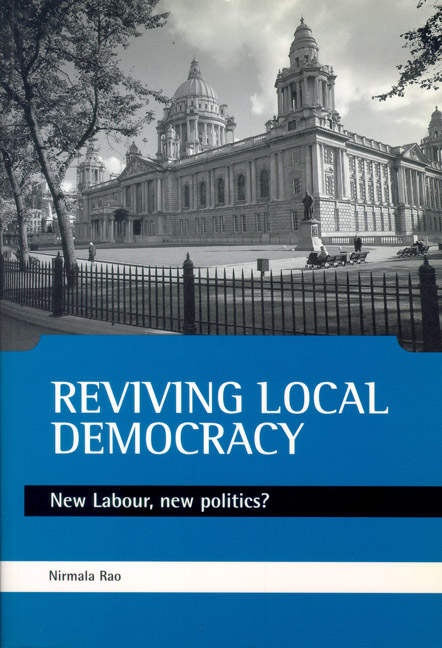Book contents
- Frontmatter
- Contents
- List of tables
- Acknowledgements
- one New times for local democracy
- two Local democracy and after
- three The failed promise of reform
- four Civic-minded Britain?
- five The reluctant voter
- six The third way and democratic reform
- seven The modernising agenda: enhancing participation
- eight The modernising agenda: new forms of political leadership
- nine Prospects for a new politics
- Bibliography
- Appendix A The surveys
- Appendix B The legislation
- Index
eight - The modernising agenda: new forms of political leadership
Published online by Cambridge University Press: 05 July 2022
- Frontmatter
- Contents
- List of tables
- Acknowledgements
- one New times for local democracy
- two Local democracy and after
- three The failed promise of reform
- four Civic-minded Britain?
- five The reluctant voter
- six The third way and democratic reform
- seven The modernising agenda: enhancing participation
- eight The modernising agenda: new forms of political leadership
- nine Prospects for a new politics
- Bibliography
- Appendix A The surveys
- Appendix B The legislation
- Index
Summary
The British system of local government, rooted in its 19th-century tradition, is essentially ‘government by committee’. Councils make decisions through their committees, to whom they may delegate their powers. All decisions originate as committee decisions and all councillors – including those from the minority parties – are, in theory, able to participate in decision making. The particular strengths of the committee system relate to its historic role in political development, which Harold Laski, writing in 1935, judged this to be of great significance:
on the whole, anyone who compares the quality of local government today with what it was one hundred years ago, cannot avoid the conclusion that … the committee system has proved itself. It stands, with the Cabinet and the modern Civil Service, as one of the fundamental English contributions to the difficult art of selfgovernment…. It has not only been a nursery of local statesmanship, some of it of remarkable quality; it has served also as a means of fertilising Westminster with the results of local experience. Its success has been a safeguard against that easy tendency to centralisation which is the paralysis of effective self-government … the techniques of the committee will certainly be found to be the pivot which makes possible the democratic operation of local government. (Laski, 1935, pp 107-8)
This essential quality of local government remains, albeit in a state of continuous change and development. True, the wide diffusion of power typical of the past is today rarely found in practice, for most authorities are run on party lines, with key decisions made behind closed doors by the majority group before being presented to committee and council to be formally taken. Similarly, the overall direction of council business is no longer left to the vagaries of collective decision, for most councils recognise the position of leader – usually the strongest person among the majority party members. Nevertheless, the committee system remains a procedural, if not a political, reality for all local authorities.
Laski's applause notwithstanding, this defining characteristic has also been local government's most criticised feature. For more than 30 years the traditional shape and operation of local government has been subject to near-continuous examination and proposals for reform.
- Type
- Chapter
- Information
- Reviving Local DemocracyNew Labour, New Politics?, pp. 163 - 190Publisher: Bristol University PressPrint publication year: 2000



